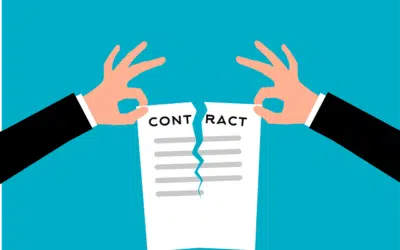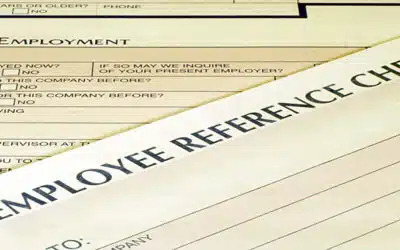Settlement Agreements are legally binding documents once they have been signed by both parties. It is therefore crucial to understand the potential consequences if the Settlement Agreement is breached. Regardless of which party breaches the Agreement, there are...
LATEST BLOGS & NEWS
Employment
Stay Protected: 7 Essential Steps to Safely Dismiss an Employee
When faced with the difficult decision to dismiss an employee for misconduct or poor performance, it’s crucial to follow established procedures to minimise the risk of disputes and litigation. Here are key steps to ensure a fair process: Never Act on Impulse Avoid...
How Can I Get Out of A Settlement Agreement?
A Settlement Agreement is a legally binding document once it has been signed. However, as long as the document remains unsigned by one or both parties, either party is entitled to cancel or withdraw from the agreement. If the Settlement Agreement has already been...
What Happens If I Change My Mind After Signing a Settlement Agreement?
Once a Settlement Agreement is signed by both parties, it becomes a legally binding document, and withdrawing from the Agreement is then no longer possible. It is, therefore, crucial to carefully consideration the implications of signing the document and seek expert...
Employment (Allocation of Tips) Act – What Does it Mean?
In May 2023, the Employment (Allocation of Tips) Act 2023 received Royal Ascent, making it unlawful for employers in the hospitality industry to withhold tips from their employees. This legislation is seen as a positive step forward for workers’ rights and will help...
What Happens if I Breach a Settlement Agreement?
Settlement Agreements are legally binding documents once they have been signed by both parties. It is therefore crucial to understand the potential consequences if the Settlement Agreement is breached. Either party may breach the Settlement Agreement, but there are...
What is a DBS Check And What Does It Involve?
DBS checks, or Disclosure and Barring Service checks are designed to help employers make a safe decision when they recruit staff. Within the dental industry this is particularly important since employees work with vulnerable adults and children. DBS checks...
What Are The Alternatives To A Settlement Agreement?
While a Settlement Agreement is a common way to settle employment-related issues, they are not appropriate in every case. There are, therefore, three alternatives that may be considered. These are: Taking the matter to tribunal Commencing ACAS EC Dropping the matter...
What is the Process for Negotiating a Settlement Agreement?
Settlement Agreements are legally binding contracts that employers use to outline the agreed conditions for either resolving a dispute or ending the employer/employee relationship. Usually, the terms of the Settlement Agreement involve offering a payment to the...
Key Steps to Navigating Redundancy Proceedings
Here is a simple step-by-step guide to navigating redundancy in the UK: Identify Redundancy Needs - Analyse the business needs and identify the roles that are no longer necessary. Speak to Trade Unions – In situations where more...
What are the Tax Implications of a Settlement Agreement?
If you are in the process of arranging a Settlement Agreement with your employer, it is imperative to understand whether there are any tax implications involved. An expert solicitor will be able to offer legal advice and explain not only the process of making the...
What is the Role of a Solicitor in a Settlement Agreement?
If your employer has presented you with a Settlement Agreement, it is crucial to take independent legal advice. Not only is this a required element of making a Settlement Agreement legally binding, but it is also the sensible course of action. Some people believe that...
Your Options When an Employee Contravenes a Settlement Agreement
In the United Kingdom, a settlement agreement (formerly known as a compromise agreement) is a legally binding contract that is used to settle a dispute or potential claim between an employer and an employee. It is typically used to resolve issues such as disputes over...
Understanding the Redundancy Consultation Period
A recent ACAS publication shows that around 20% of SMEs are facing the prospect of making redundancies in 2023 due to the significant economic pressures plaguing the UK. Whether your SME is one of the 20% or not, understanding how to run a redundancy consultation is a...
What Are The Specific Provisions That Should Be Included In A Settlement Agreement?
Settlement Agreements contain a variety of provisions that vary depending on the reason the document is being drawn up. These provisions will also vary depending on whether the employee’s contract with the business has been terminated already. Nevertheless, there are...
Employment Relations (Flexible Working) Act 2023 – What Changes Can You Expect to See?
In July, the Employment Relations (Flexible Working) Act 2023 received Royal Assent. This significant piece of legislation is designed to make flexible working arrangements easier to achieve for employees across the country. Find out more about it here. The...
Is a Settlement Agreement a Good Idea?
Terminating employment can be a difficult time for both the employee and the employer. In situations where a workplace dispute has arisen, a settlement agreement can be a good idea to avoid the potentially length legal process of an employment tribunal. However, there...
How Can I Protect Myself from Being Taken Advantage of in a Settlement Agreement?
When making a Settlement Agreement, there is always the possibility of being taken advantage of if you lack the necessary knowledge and expertise in the law. It is, therefore, crucial to seek out advice from a specialist legal professional who will be able to give you...
Including A Reference As Part Of A Settlement Agreement
It's common practice for an employee to request a reference as part of their Settlement Agreement with you, but what are your legal obligations? Interestingly, unless you are part of a regulated industry, there is no legal requirement for you to provide a reference...
Can a Settlement Agreement be enforced?
A Settlement Agreement, once it has been signed by both parties, is a legally binding document and can, therefore, be enforced. In the event that either party breaches the terms that were agreed upon in the document, action can then be taken against them as long as...
What is the Difference Between Redundancy and a Settlement Agreement?
Terminating the contract of an employee is not usually a decision that is made without much consideration. The process for terminating employment will be different depending on the circumstances of the employment and the reason for the termination. Whether or not the...
The Role of TUPE in Restructures and Redundancies
According to employment laws in the UK, employers have a legal obligation to consult thoroughly regarding both restructuring and redundancy. This includes not only discussions on the necessity of reducing workforce roles or creating new ones to better align with the...
Staff Handbook Vs Employment Contract – Knowing the Difference
As an employer, providing your employees with clear and legally approved contracts of employment is critical, both to adhere to legal requirements and to set out what is expected from both parties during the term of employment. In addition, many employers also issue...
Redundancy Selection Pools And How To Use Them
A redundancy selection pool is a way to group employees with similar roles who are at risk of redundancy. It is crucial to ensure that the selection process is impartial and without discrimination and to document the selection criteria and methodology used. It's worth...
How To Vary An Employment Contract
There are different steps to be taken when changing the terms of an employment contract, depending on whether the changes are being proposed by the employer or the employee, and depending on the nature of the changes. First, obtain the employee’s written consent by...
Employee-Friendly Settlement Agreement FAQ
1. What is a Settlement Agreement? A Settlement Agreement is a legally binding agreement between you and your employer. The purpose is to resolve a dispute between you and your employer; however, a Settlement Agreement is usually entered into on termination of your...
Everything You Need To Know About Holiday Pay For Part Year Workers
In light of the recent court case of Harpur Trust v Brazel, which was heard in the Supreme Court, you may have some questions surrounding the outcome of the judgement and what this means in terms of paid holiday days for employees who have irregular working hours or...
As An Employee, Which Types Of Flexible Changes To My Working Patterns Can I Request?
If you’re an employee, you may be keen to adopt a more flexible working pattern. While there is a common misconception that only carers or parents have the right to ask for changes of this kind, that isn’t actually true. Any employee has the right to request a...
Why Are Settlement Agreements Used By Employers?
Sometimes, employers use settlement agreements when an employee’s employment is being terminated. But why are they used? Here, we take a closer look at what they are and why an employer may choose to use one. What Are Settlement Agreements? Sometimes called Compromise...
Was My Redundancy An Unfair Dismissal?
Many businesses needing to reduce their workforce offer redundancy to their surplus employees, but occasionally, employers call certain situations redundancy even though there isn’t a genuine business reason for dismissing the employees in question. ...
Unfair Dismissal – What Are My Rights Under The Law?
If you believe you were dismissed unfairly from your job, you may have a case for unfair dismissal. However, understanding what this means is important if you wish to challenge your employer. If your employer had a just reason that was sufficient to justify your...
Phantom Share Options
Phantom Share Options are used for employee benefits and provide a great way to offer incentives to current or potential staff. Find out more about them here. Finding ways to reward your team or incentivise new starters can be a headache, especially when you are...
Can You Make Your Employees Have the COVID Vaccine?
When it comes to vaccinating your workforce, you may be tempted to make it a mandatory process so that you can ensure the highest levels of safety. However, there is a very fine line between acting in everyone’s best interests and breaking the law and keeping on the...
New Supreme Court Ruling Determines Uber Drivers Not Self-Employed
The UK’s Supreme Court has ruled that under current circumstances Uber drivers are classed as part of a company workforce rather than as an individual working on a self-employed basis. This decision is likely to have hefty consequences for the revolutionary taxi app,...
How to Ace the Test and Trace – Guidance for Employers
With the COVID-19 outbreak continuing to disrupt the economy and businesses across the UK, employers are legally obliged to maintain records of staff, visitors, and customers to help NHS Test and Trace inform those who may have been exposed to the virus. Employers in...
How to Protect Your Remote Workers Against Cybercrime
Working from home may reduce your employees’ exposure to COVID-19 but it also makes them easy targets for cybercriminals. Relying on online video-conferencing and collaboration tools, as well as cloud-based storage and software, has exposed many companies’ weak spots,...
Handling Redundancies during the COVID-19 Pandemic
More employers are having to make redundancies due to COVID-19, but how should they be handled? Here we take a look at getting the process right. Unfortunately, because of the COVID-19 pandemic, some employers have had to consider making redundancies amongst their...
Employers’ Most Frequently Asked Questions About Coronavirus
The COVID-19 pandemic has raised a host of questions for employers who are wondering about their rights and obligations. Here you’ll find some answers. Employers have many questions about their rights and obligations when it comes to their workers and workplaces...
What Should I Know As An Employer About The Government’s Job Support Scheme?
The government has put in place a job support scheme to replace the furlough scheme, but what should employers know about it? Read on to learn more. For business owners and employees alike, the removal of the furlough scheme at October’s end was a concerning prospect....
Covid-19: Contact Tracing and Data Protection in the Workplace
Minimising contact is seen as vital to minimise the spread of COVID-19 in the community. Employers have a very significant role to play in the process but it can be challenging balancing up privacy and data laws with the need to protect other employees. Here’s a...
Covid-19: Considering Redundancies as Furlough Scheme Closes
The furlough scheme is credited with saving many jobs, supporting businesses while they navigated the peak of the COVID-19 crisis. However, the scheme was never intended to stretch on forever, and businesses are now contemplating what the future looks like as...
Covid-19 Update: Employer FAQs
The government has issued advice to employer on how to manage COVID-19 and the support that is available. While this is subject to change at little notice, these FAQs are based on the latest information published and cover some of the areas which haven’t been as...
Covid 19: Furlough Leave and TUPE
When a business changes owner, its members of staff will find that they are protected under the Transfer of Undertakings (Protection of Employment) regulations, otherwise known as TUPE. It applies to all UK businesses, regardless of their size, number of employees or...
Covid 19: Working From Home During Coronavirus: How To Handle Data Security
With the coronavirus forcing us to take on new ways of living including social distancing, queueing outside for the weekly grocery shop and having to transform our dining room tables into a home office, we are finding more and more challenges arising in everyday...
Covid 19: Furlough Advice For Employers
Until a few weeks ago, nobody had even heard of the word ‘furlough’ – but now, it’s something we’re seeing in the news and all over the internet every single day. The coronavirus pandemic doesn’t look like it’s going to slow down...
Covid – 19: Will court hearings still go-ahead during coronavirus lockdown?
With the entire nation having to adapt to the major disruption that the global COVID-19 pandemic has brought along, it feels like life has been temporarily put on hold. Almost everybody is having to work from home if they can, and children are being home-schooled. The...
Covid-19 – Is it an excuse for non-performance of a commercial contract?
Covid-19 is starting to have a significant impact worldwide, affecting supply chains and daily commercial operations. While the short-term implications have seen many businesses close their doors entirely or switch to remote working where possible, the long-term...
Covid-19: Are you an employee? Do you know your rights?
There is no denying that we are living in uncertain times at the moment and the best thing you can do right now is educate yourself on your position and the different options that are available to you as an employee. Working from home The advice from the government is...
Covid-19: What employers should be aware of
If there is one thing that everyone is speaking about at the moment, it is the coronavirus - and rightly so; we are living through something that we have never experienced before in living memory. If you are an employer, you may be concerned about the future of your...
Coronavirus (Covid-19) – Update for employers and employees on Job Retention Scheme
After much speculation, the Government has now released more detailed guidance on the Job Retention Scheme which can be found at https://www.gov.uk/guidance/claim-for-wage-costs-through-the-coronavirus-job-retention-scheme This update provide is a guide and aims to...















































